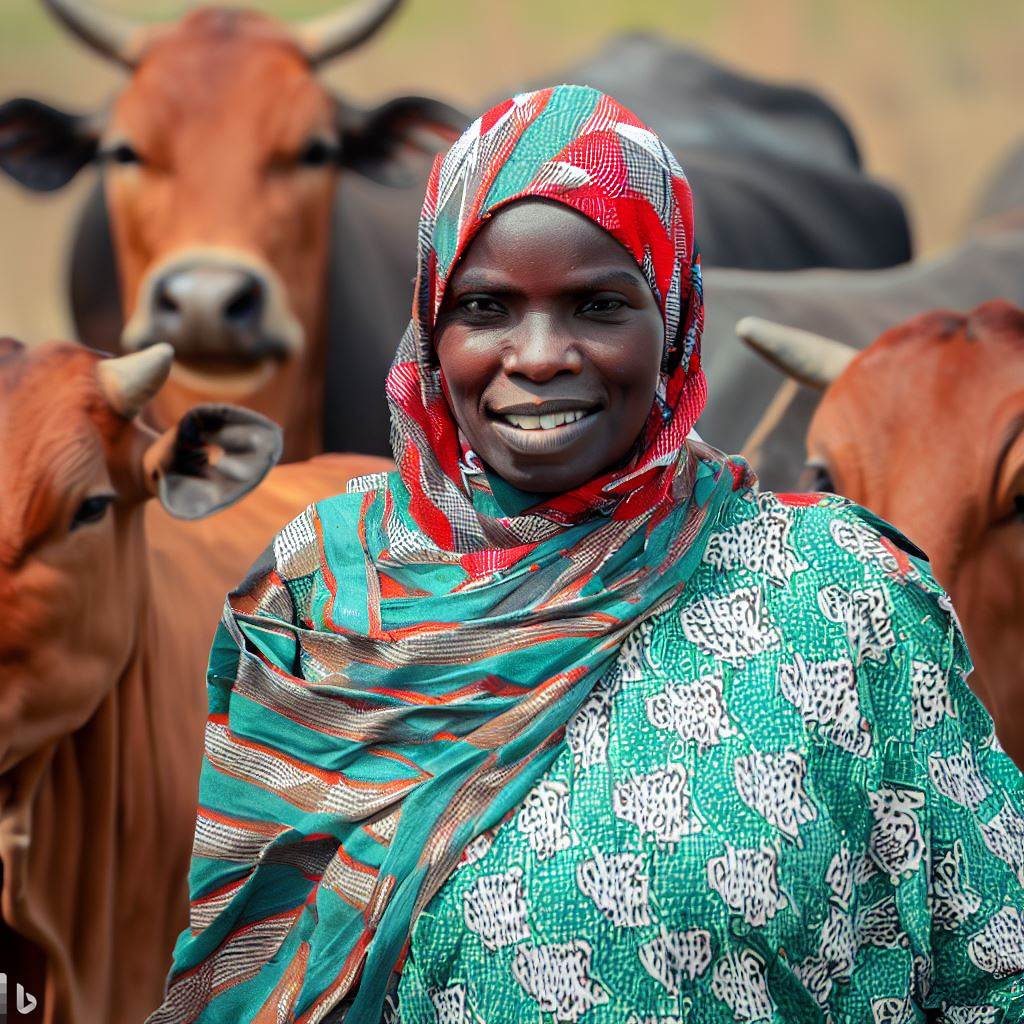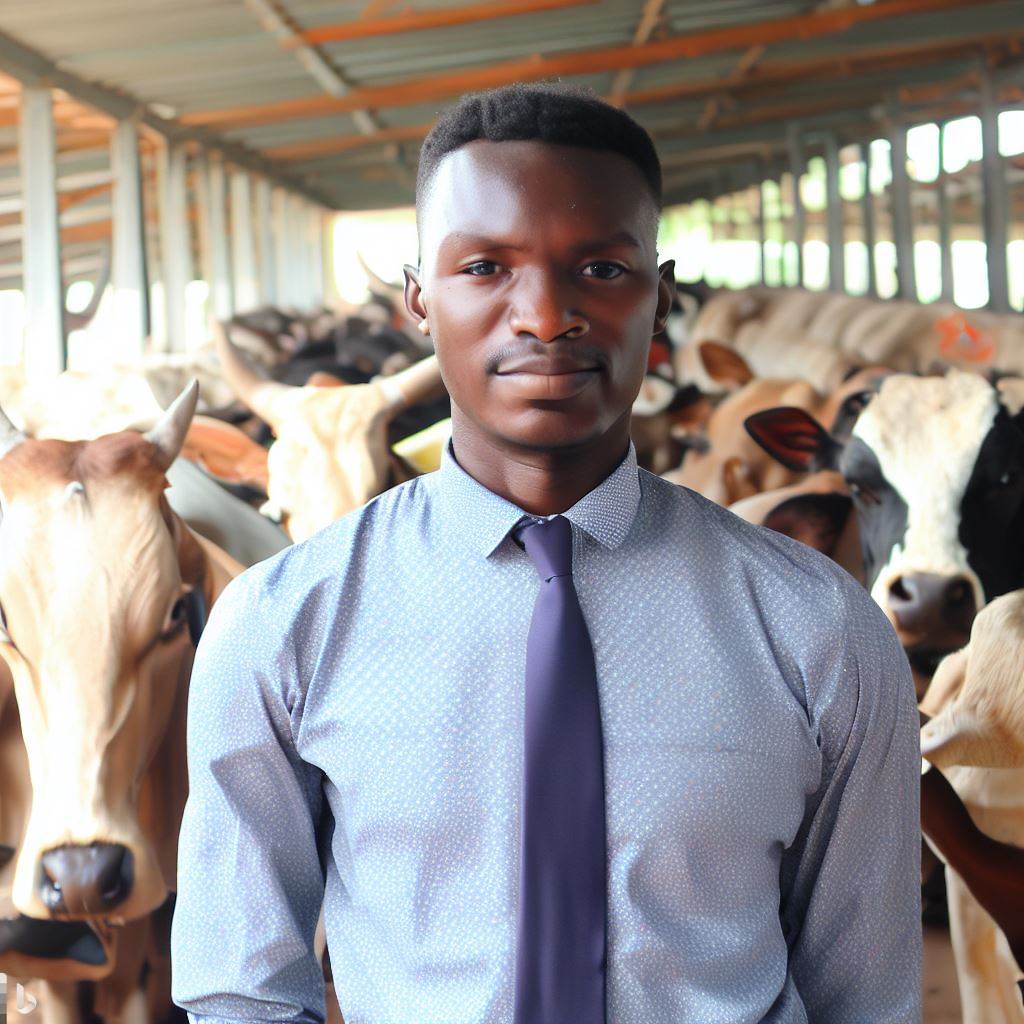Introduction
Nigeria’s food security situation: An overview of the current state of food security in Nigeria. The purpose of the blog post is to explore the role of livestock in addressing the food security issue in Nigeria.
Food security is a critical concern for Nigeria, as the country faces numerous challenges in meeting its population’s dietary needs.
With a large population and limited resources, ensuring a stable food supply is of utmost importance. This blog post aims to shed light on the significance of livestock in Nigeria’s food security.
Livestock plays a vital role in Nigeria’s food security by providing a source of nutritious food, job opportunities, and income generation.
The livestock sector contributes significantly to the country’s overall agricultural production, with the production of meat, milk, and eggs.
Livestock rearing not only provides access to animal protein but also serves as a source of income for many households, especially in rural areas.
The sale of livestock products such as meat and dairy allows individuals to earn a living and support themselves and their families.
Additionally, the livestock sector creates employment opportunities for a wide range of people, including animal farmers, herders, butchers, and veterinarians.
This helps reduce unemployment rates and boost the economy.
However, challenges such as disease outbreaks, inadequate infrastructure, and low productivity hinder the efficient utilization of livestock resources in Nigeria.
These issues need to be addressed through policy interventions, improved animal healthcare, and capacity-building initiatives. In the end, livestock plays a crucial role in ensuring food security in Nigeria.
By recognizing the importance of livestock and implementing measures to enhance its productivity and sustainability, Nigeria can make significant strides towards achieving long-term food security for its population.
The significance of livestock in Nigeria’s food security
Livestock play a crucial role in Nigeria’s food security, providing significant contributions to both production and consumption.
With a population of over 200 million people, Nigeria is the most populous country in Africa and the seventh most populous in the world.
This growing population poses challenges to food security and highlights the importance of livestock.
Statistics on livestock production and consumption in Nigeria
Nigeria has a rich agricultural sector, with livestock accounting for a significant part of it.
According to statistics, the country’s livestock sector contributed about 11.4% to its gross domestic product (GDP) in 2019. This shows the economic importance of livestock production in the country.
The main types of livestock in Nigeria include cattle, goats, sheep, and poultry. Cattle rearing, in particular, plays a vital role in the country’s economy.
Nigeria is the largest producer of cattle in West Africa and the third-largest in Africa.
Nigeria’s consumption of livestock products is also substantial. The average Nigerian consumes about 7.7 kilograms of meat per year, which is relatively low compared to the global average.
However, the demand for meat is expected to rise due to population growth and increasing urbanization.
Livestock’s contribution to dietary protein intake
Livestock products are an essential source of dietary protein in Nigeria. Protein is a crucial nutrient for growth, development, and overall health.
Livestock products such as meat, milk, and eggs provide high-quality protein that is easily digestible.
In Nigeria, protein deficiency is a prevalent issue, particularly among children and pregnant women. Livestock products help address this problem by providing a reliable source of protein.
They also contribute to a diversified diet, improving overall nutrition and reducing the risk of malnutrition.
Role of livestock in providing essential nutrients
Besides protein, livestock also provide essential nutrients like vitamins and minerals. These nutrients are crucial for maintaining optimal health and preventing micronutrient deficiencies.
Meat, for instance, is a good source of iron, zinc, and vitamin B12. Iron deficiency is a significant health issue in Nigeria, leading to conditions such as anemia.
Livestock products can help combat iron deficiency by providing a readily-available source of this nutrient.
Milk and dairy products are rich in calcium, which is essential for bone health. Calcium deficiency is also prevalent in Nigeria, especially among women and children.
The inclusion of dairy products in the diet can help address this issue and reduce the risk of conditions like osteoporosis.
In fact, livestock play a vital role in ensuring food security in Nigeria. They contribute to the country’s economy through production and consumption.
Livestock products provide valuable protein and essential nutrients, addressing nutritional deficiencies and improving overall health.
To ensure sustainable food security, it is essential to invest in the livestock sector and promote its development.
Read: Importance of Breeds in Nigerian Livestock Production
Livestock farming systems in Nigeria
In Nigeria, there are two main types of livestock farming systems: traditional extensive and commercial intensive.
Traditional extensive livestock farming
The traditional extensive livestock farming system is characterized by its reliance on natural grazing and low input levels.
It is a common practice among rural communities in Nigeria. In this system, livestock are allowed to roam freely in search of food and water.
Commonly raised livestock in traditional extensive farming systems include cattle, goats, and sheep. These animals are well adapted to the local environment and require minimal human intervention.
However, traditional extensive livestock farming in Nigeria faces several challenges and limitations. These include inadequate grazing land, limited access to water sources, and insufficient veterinary services.
Additionally, conflicts between herders and farmers over land usage have become a major issue in recent years.
Commercial intensive livestock farming
On the other hand, commercial intensive livestock farming is a more modern and intensive approach to animal production.
It involves the use of concentrated feeding, controlled environments, and high input levels.
Poultry, pigs, and fish are commonly raised in commercial intensive farming systems in Nigeria. These animals are bred for their meat, eggs, and other by-products.
Commercial intensive livestock farming offers several advantages, such as increased productivity and higher yields.
It allows for the production of large quantities of meat and other animal products to meet the growing demand. Additionally, it creates employment opportunities and contributes to economic development.
However, commercial intensive livestock farming also has its disadvantages. It requires significant financial investments in infrastructure and inputs.
Moreover, intensive farming practices can lead to environmental issues, such as pollution from waste and the excessive use of antibiotics.
In conclusion, Nigeria has both traditional extensive and commercial intensive livestock farming systems. Each system has its own characteristics, commonly raised livestock, and advantages or disadvantages.
Understanding these different farming systems is crucial for ensuring food security and sustainable livestock production in Nigeria.
Read: Leveraging Cooperatives for Dairy Production in Nigeria
Contributions of livestock to Nigeria’s economy
Employment opportunities created by the livestock sector
- Livestock farming provides job opportunities for a significant number of Nigerians.
- The sector employs both skilled and unskilled labor, contributing to poverty alleviation.
- Individuals find employment in various stages of the livestock value chain, such as rearing, processing, and marketing.
- Livestock farming also generates indirect employment in support services like transportation and veterinary care.
- The sector’s employment opportunities help reduce unemployment rates and improve the livelihoods of Nigerians.
Livestock’s impact on rural livelihoods
- Livestock plays a crucial role in supporting the livelihoods of rural communities in Nigeria.
- Rural households rely on livestock for food, income, and cultural purposes.
- Livestock products provide essential nutrients to rural households, improving nutrition and overall health.
- Rural communities engage in small-scale livestock farming as a means of income diversification and risk reduction.
- Livestock farming contributes to poverty reduction and enhances the resilience of rural communities.
Revenue generation through export of livestock products
- Livestock products contribute significantly to Nigeria’s export earnings.
- The export of livestock products, such as meat, dairy, and hides, generates foreign exchange.
- Livestock exports create trade opportunities and promote economic growth.
- Nigeria’s livestock industry has the potential to increase its export volumes and expand market reach.
- Revenue from livestock exports can be reinvested in the sector to further enhance its contribution to the economy.
In essence, the livestock sector in Nigeria plays a pivotal role in the economy. It creates employment opportunities, particularly in rural areas, contributing to poverty reduction and improved livelihoods.
Additionally, livestock farming generates revenue through the export of products, further strengthening Nigeria’s economy.
It is essential to support and invest in the livestock sector to unlock its full potential and ensure sustainable food security in the country.
Read: Nigeria’s Pioneering Dairy Producers: Success Stories

Challenges faced in the livestock sector
The challenges faced in Nigeria’s livestock sector greatly impact the country’s overall food security.
Addressing these challenges is crucial to ensure sustainable livestock production and meet the nutritional needs of the population.
Disease outbreaks and biosecurity issues
Disease outbreaks pose a serious threat to livestock in Nigeria.
Contagious diseases like Foot-and-Mouth Disease, African Swine Fever, and Avian Influenza can quickly spread within and across regions, resulting in significant economic losses for farmers and disrupting food supply chains.
Limited disease surveillance and control systems exacerbate the impact of disease outbreaks.
Insufficient funding, inadequate veterinary expertise, and weak coordination among relevant stakeholders hamper effective disease monitoring, prevention, and control measures.
Biosecurity issues compound the challenges faced in disease management.
Poor farm hygiene, unregulated movement of animals, and lack of quarantine measures increase the risk of disease introduction and rapid spread.
Farmers often lack awareness of biosecurity protocols and fail to implement them, further endangering the livestock population.
Limited access to veterinary services and vaccines
In Nigeria, many livestock farmers struggle with limited access to veterinary services and vaccines, impeding their ability to prevent and treat diseases.
The shortage of trained veterinarians and veterinary clinics in rural areas restricts farmers’ access to professional assistance, resulting in inadequate healthcare for their livestock.
The high cost of veterinary services and vaccines poses an additional barrier, particularly for small-scale farmers who cannot afford them.
The lack of government subsidies or support programs further exacerbates this issue, making it challenging for farmers to access essential veterinary resources.
Inadequate cold chain infrastructure also affects the availability of vaccines.
The required cold storage facilities for vaccines are often absent or malfunctioning, rendering them less effective and reducing their availability in remote areas.
Inadequate infrastructure and technological advancements
The inadequate infrastructure and limited adoption of technological advancements hinder the growth and productivity of Nigeria’s livestock sector.
Insufficient road networks, electricity, and storage facilities make it difficult to transport, process, and store livestock products, resulting in post-harvest losses.
Lack of access to modern farming technologies, such as improved breeds, efficient feeding systems, and automated milking machines, reduces productivity and efficiency in livestock production.
The use of outdated farming practices limits the sector’s potential and makes it less attractive for investment.
Furthermore, the inadequate use of information and communication technology (ICT) in the livestock sector restricts access to market information, veterinary advice, and financial services for farmers.
This hampers decision-making, productivity, and overall profitability.
In a nutshell, the challenges faced in Nigeria’s livestock sector, including disease outbreaks and biosecurity issues, limited access to veterinary services and vaccines, and inadequate infrastructure and technological advancements, pose significant obstacles to achieving food security.
Addressing these challenges requires a holistic approach involving improved disease surveillance, increased investment in veterinary services, enhanced infrastructure development, and promotion of technological innovations in livestock production.
Read: Profitability Analysis of Dairy Production in Nigeria
Government initiatives and policies to enhance livestock production
National Livestock Transformation Plan (NLTP)
The Nigerian government initiated NLTP to modernize livestock farming, increase productivity, and ensure food security.
In the realm of livestock and food security, Nigeria has implemented comprehensive initiatives to ensure self-sufficiency and prosperity.
One of the cornerstones of this strategy is the National Livestock Transformation Plan (NLTP).
Under NLTP, the government is actively modernizing the livestock sector, focusing on increasing productivity, ensuring quality animal health, and fostering sustainable growth.
This initiative resonates with the active approach, embodying the nation’s commitment to enhancing its food security.
Sedentarization and Pastoralist Support
Government aids pastoralists by promoting settled livestock farming, providing training, healthcare, and social services.
Additionally, the government has undertaken measures to support pastoralists by encouraging sedentarization.
This shift from nomadic herding to settled livestock farming not only stabilizes communities but also allows for improved access to education, healthcare, and social services.
This approach actively addresses challenges faced by pastoralists, ensuring their well-being while contributing to the overall food security of the nation.
Investment in Breeding and Research
Funds are allocated for advanced breeding programs, disease-resistant livestock, and cutting-edge research, elevating productivity.
Furthermore, investments have been channeled into breeding programs and research.
These active endeavors lead to the development of disease-resistant livestock, improved breeds, and advanced agricultural practices.
This commitment to innovation and knowledge dissemination plays a pivotal role in boosting livestock production and, in turn, strengthening Nigeria’s food security.
Basically, Nigeria’s government has embraced an active stance in promoting livestock for food security.
Through NLTP, pastoralist support, and strategic investments in research and breeding, the nation is taking robust steps toward enhancing its self-reliance and ensuring a stable food supply for its citizens.
Potential solutions to improve the role of livestock in Nigeria’s food security
Promoting sustainable livestock practices
- Encourage farmers to adopt sustainable farming methods that reduce the impact on the environment.
- Promote the use of organic feed and natural remedies to prevent diseases in livestock.
- Implement rotational grazing systems to maintain soil fertility and prevent overgrazing.
- Provide training and education programs to farmers on sustainable livestock practices.
- Support research and development of innovative technologies for sustainable livestock production.
Strengthening veterinary services and disease control measures
- Invest in the infrastructure and equipment necessary to provide accessible veterinary services across the country.
- Train and educate veterinarians to improve their skills in disease control and prevention.
- Increase funding for disease surveillance and monitoring programs to quickly identify and respond to outbreaks.
- Implement strict biosecurity measures to prevent the spread of diseases between farms.
- Collaborate with international organizations to access expertise and knowledge in disease control.
Encouraging public-private partnerships in the livestock sector
- Foster collaboration between government agencies, private stakeholders, and farmers to address challenges in the livestock sector.
- Create incentives for private companies to invest in livestock production and related infrastructure.
- Develop public-private partnerships to improve access to finance and technology for small-scale farmers.
- Establish platforms for knowledge sharing and cooperation among stakeholders.
- Support capacity building programs to enhance the skills and knowledge of farmers and entrepreneurs.
By implementing these potential solutions, Nigeria can greatly improve the role of livestock in ensuring food security for its population.
Promoting sustainable livestock practices will not only protect the environment but also contribute to the production of high-quality and nutritious food.
Strengthening veterinary services and disease control measures will help prevent and control outbreaks, reducing the loss of livestock and safeguarding the health of both animals and humans.
Encouraging public-private partnerships will foster innovation, investment, and collaboration, leading to a more resilient and productive livestock sector.
It is crucial for the Nigerian government to prioritize these solutions and allocate adequate resources to their implementation.
Additionally, continuous monitoring and evaluation of the progress made will be necessary to adapt and refine strategies as needed.
By working together, stakeholders can create a sustainable and secure food system that benefits both present and future generations.
Conclusion
Livestock plays a crucial role in ensuring food security in Nigeria. It provides a significant source of protein, essential nutrients, employment opportunities, and income generation for millions of people.
Despite its importance, the livestock sector in Nigeria faces several challenges, including disease outbreaks, inadequate infrastructure, and limited access to credit and markets.
It is crucial for stakeholders, including the government, farmers, researchers, and investors, to come together and address these challenges.
By investing in research and development, improving animal healthcare services, providing better access to finance and markets, and promoting sustainable and efficient farming practices, stakeholders can unlock the potential of the livestock sector and enhance Nigeria’s food security.
Furthermore, there is a need for increased collaboration between the public and private sectors to drive innovation and technology adoption in the livestock sector.
This will help improve productivity, reduce post-harvest losses, and enhance the value chain from production to consumption.
Livestock plays a vital role in ensuring food security in Nigeria. To fully realize its potential, it is imperative for stakeholders to address the challenges and seize the opportunities present in the sector.
By doing so, Nigeria can strengthen its food security, improve livelihoods, and contribute to overall economic growth.




